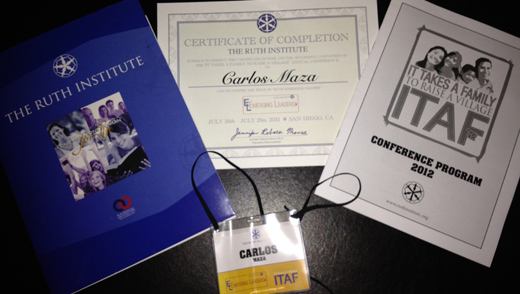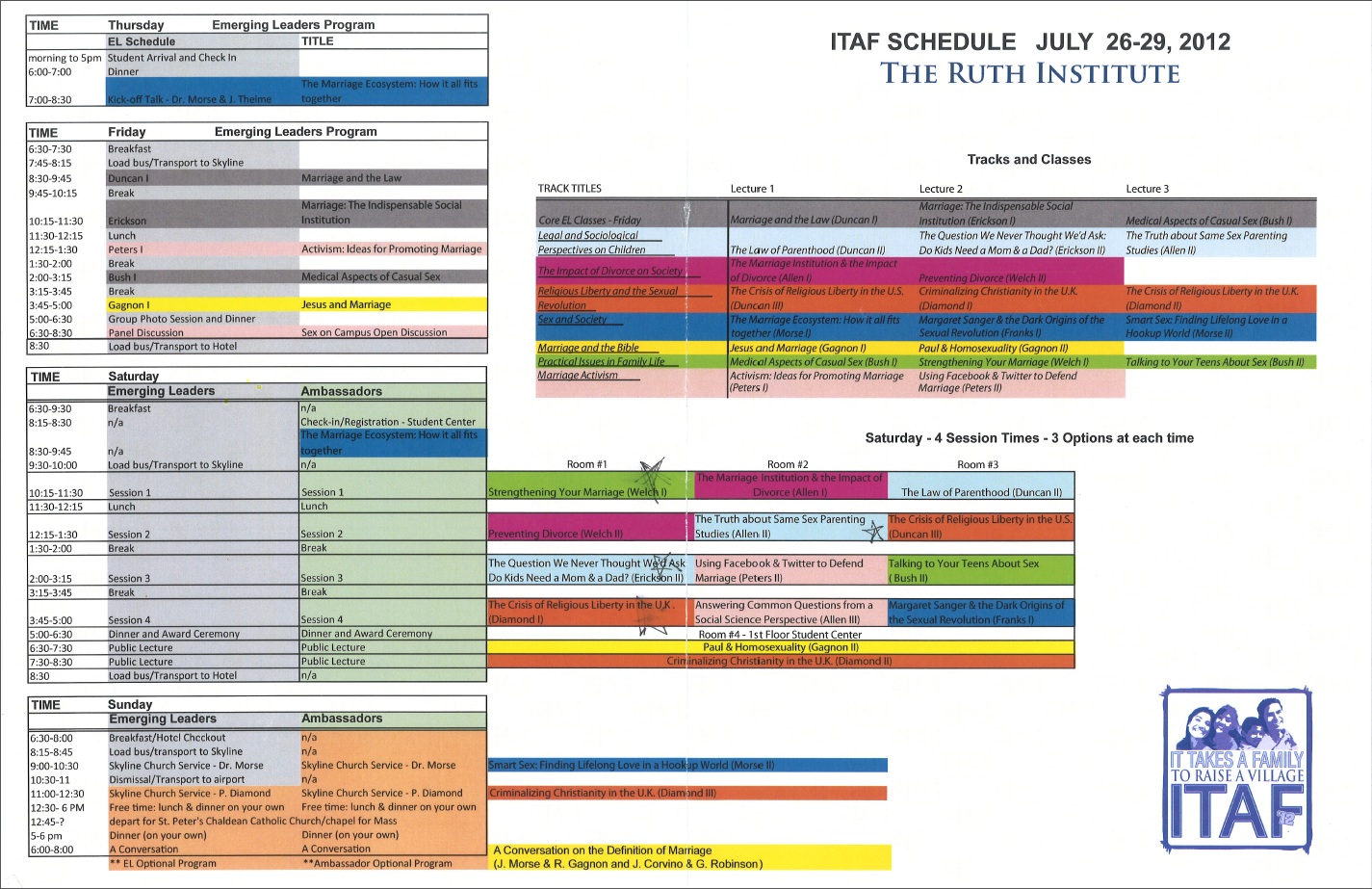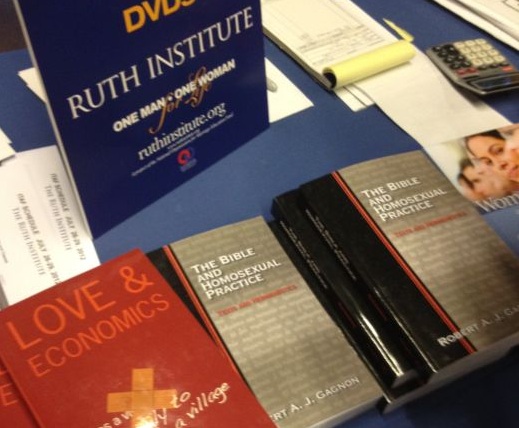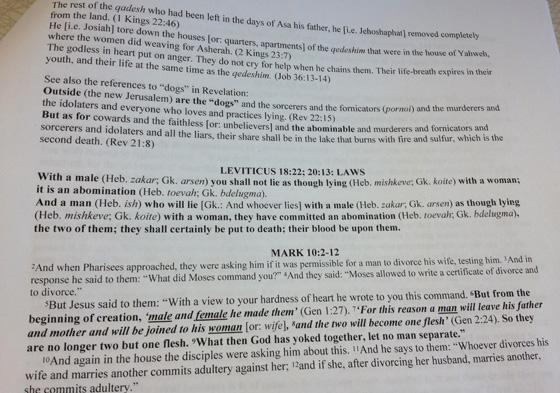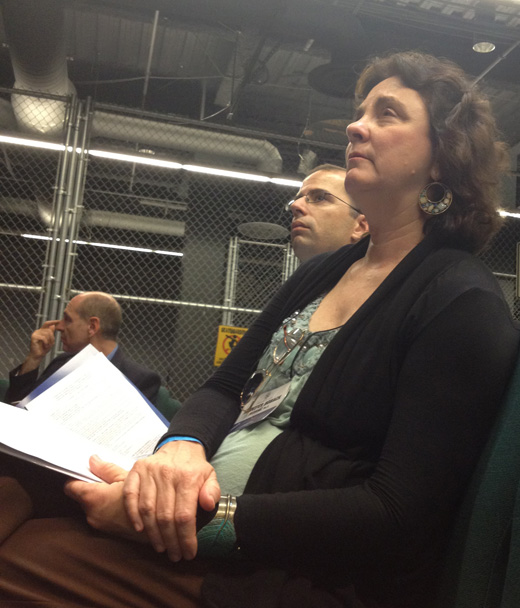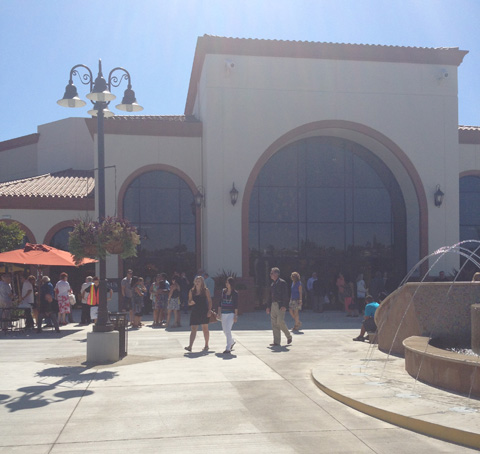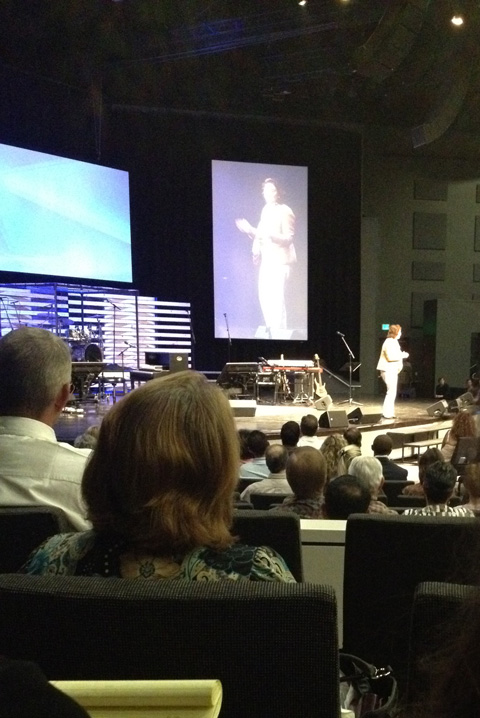Every summer for the past four years, the National Organization for Marriage's (NOM) Ruth Institute has invited college students from across the country to participate in its weekend-long "It Takes A Family To Raise A Village" (ITAF) conference in San Diego, CA. According to NOM, the conference is meant to prepare college students to defend “natural marriage” on their campuses by introducing them to a number of prominent anti-gay speakers and activists.
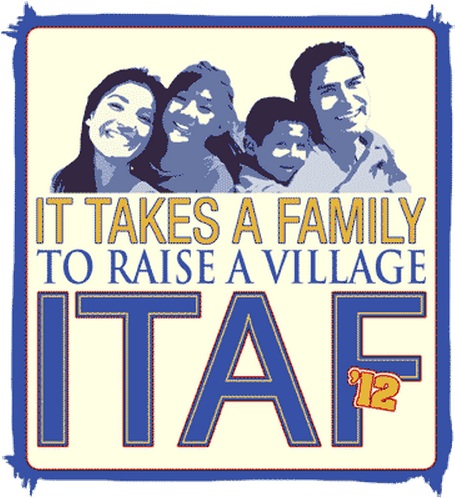
This year, NOM expanded its ITAF conference to include recent college graduates in their early twenties. Being a 24-year-old gay blogger who has spent the better part of the past two years tracking NOM's anti-gay extremism, I wasn't expecting much when I applied to ITAF's “Emerging Leaders” program in mid-June. I'd spent most of the month publishing blog post after blog post about ITAF's anti-gay “suggested reading” list, its roster of extreme anti-gay speakers, and its ties to a megachurch linked to the “ex-gay” movement. The application didn't require me to disclose my place of employment, but a quick Google search of my name would plainly reveal that I was no friend of NOM. Jennifer Morse, the president of NOM's Ruth Institute, had even specifically responded to a post I'd published about her. I saw my application as more of a joke than anything else.
So when I got a “Congratulations” email at the end of July informing me that I'd been accepted into ITAF, I wasn't sure how to react.
Honestly, part of me was terrified at the idea of having to spend a whole weekend stuck at a NOM event with a group of anti-gay student activists. What if I was discovered? What if someone from NOM recognized me? If I attended, I ran the risk of being exposed - all alone - as an undercover “homosexualist” in a room full of the very people I'd been writing about for months.
I also wasn't keen on the idea of having to pretend to be straight in front of dozens of strangers for four days, as I didn't expect I'd be able to attend a NOM conference as an openly gay man without raising a few eyebrows. I'd been out of the closet for over eight years, and I lived in a city where being gay is as about as common and unremarkable as wearing glasses. I'd grown pretty accustomed to not having to worry about people figuring out my sexual orientation. Having to go back in “the closet,” even just for a few days, sounded more like an unpleasant high school flashback than an exciting work opportunity.
Eventually, though, my curiosity got the better of me.
Since its founding in 2007, NOM has loudly proclaimed that its "battle is not with an orientation"; that, despite opposing gay marriage, the organization isn't motivated by animosity towards gay and lesbian people. This distinction - “we're not anti-gay, just anti-gay marriage” - has allowed NOM to differentiate itself from organizations that have been labeled "hate groups" for peddling known falsehoods about LGBT people.
But, I wanted to see it for myself. Attending ITAF would give me an opportunity to find out what NOM was really saying about LGBT people when it wasn't mincing words for mainstream media outlets.
So on Thursday, July 26, armed with little more than my camera phone, a notepad, and a hastily-concocted backstory, I boarded a flight to San Diego to attend what would end up being one of the most disturbing and overtly homophobic experiences of my life.
Day One: Opening ceremony, Dr. Morse's keynote speech, and meeting my conference roommate.
Day Two: “Unstable” same-sex relationships, gay stereotypes, and Jesus' condemnation of homosexuality.
Day Three: Parenting misinformation, the pedophilia connection, and Leviticus.
Day Four: Morning services, a “conversation on marriage,” and a confession.
NOM's ITAF conference began on Thursday night with a group dinner at San Diego's Marina Village. I sat at a table with a handful of Mormon students from Brigham Young University, and it wasn't long before we were exchanging small talk about who we were, where we came from, and how we found out about the conference.
I told them I was a practicing Catholic (false) who recently graduated from Wake Forest University (true), where I was a member of the university's debate team (true). I told them that I worked with my mom at a computer software company in Miami, FL (false) but was planning to move to Washington, DC in order to be closer to my long-term college girlfriend (absolutely false). I also claimed to have found out about ITAF through the Ruth Institute's YouTube page (true), which I was browsing to learn more about how to defend traditional marriage (could not be more false).
Looking over the Emerging Leaders student roster, I noticed that the two largest groups of students were from BYU and Arizona State University. Some of the participants were local while a handful of others had travelled all the way from South America to attend. College students who attended ITAF were given the opportunity to receive one unit of college credit - “Special Topics in Christian Worldview” - from Oklahoma Wesleyan University.
Of those attendees who were no longer in college, many had already begun their professional careers. According to the bios distributed by the Ruth Institute at the start of the conference, attendees included a high school teacher, a staffer at the Institute on Religion and Democracy, and an attorney with the Senate Judiciary Committee.
And then, of course, there was me:
Dinner was followed by a keynote address from Dr. Jennifer Roback Morse, president of NOM's Ruth Institute. She spoke about the importance of children having mothers and fathers and the threat posed by efforts to redefine marriage. It was a speech I'd heard her give some variant of a dozen times before, usually sitting in my office listening to the Ruth Institute's podcasts. This time, though, she was just a few feet away from me, answering questions about how to best combat “feel-good” stories about same-sex families. Listening to similar questions from around the room, I became acutely aware that I was not in the company of friends.
That night, I arrived at my hotel to discover that I would be sharing a room with another ITAF attendee - a man who described himself as “pro-life, pro-family, pro-Christianity from top to bottom, through and through.” He was wearing a t-shirt that read, in bold red letters, “BARACK OBAMA, THE ABORTION PRESIDENT.”
I went straight to bed.
Friday marked the beginning of ITAF's formal program. I joined the roughly forty other ITAF attendees on a bus that would transport us to Pastor Jim Garlow's Skyline Church - one of the biggest megachurches in the country - for a full day of seminars on topics related to sex and marriage.
On the drive to the church, I listened to NOM's Morse celebrate the announcement of San Francisco's new archbishop, Salvatore Cordileone - often referred to as the “godfather” of Proposition 8, the California ballot initiative that banned gay marriage. Morse called the announcement a “poke in the eye to Castro Street,” San Francisco's most famous gay neighborhood. She also wondered if the archbishop would deny House Minority Leader Nancy Pelosi (D-CA) communion.
Leaning in from behind my seat near the back of the bus, a BYU student asked me a question I wasn't prepared to answer: “When are you going to pop the question to your girlfriend?” I hadn't fully realized that, in this alternate, heterosexual version of my life, getting married was both a legal possibility and a social expectation. “I'm waiting until I see what it's like living in the same city as her,” I mumbled, quickly growing tired of talking about this imaginary woman I had never met and could never love.
Same-Sex Relationships Are “Dysfunctional,” “Inherently Unstable”
At Skyline, we shuffled into a large room that appeared to be reserved for putting on performances for kids. There were colorful shapes on the walls, a large stage, and even a small window for puppet shows.
It was disturbing setting for a conference that focused on the threat gay people pose to their own children.
The first seminar of the morning was given by Bill Duncan, director of the anti-equality Marriage Law Foundation. His talk - "Marriage and the Law" - attempted to establish a legal case for barring same-sex couples from marrying. The speech was basically a rehashing of NOM's list of pre-approved marriage talking points; marriage is about procreation, marriage equality would redefine the institution of marriage for everyone, mothers and fathers aren't optional, etc.
It was also a perfect example of the kind of 'protect marriage' rhetoric NOM prefers to use when it's in the public eye. Duncan's comments were anti- equality, sure, but none of what he said was particularly anti-gay.
Next up was Dr. Jenet Erickson, an assistant professor at BYU's School of Family Life. Her seminar, titled "Marriage: The Indispensable Social Institution," focused on the relationship between marriage and parenting by attempting to make the case that married, heterosexual couples offer the best environment for raising children. She called same-sex relationships "inherently unstable," suggesting that gay partners eventually get bored of each other as a result of having the same gender.
At the end of her speech, Erickson was asked how she would counter stories of well-adjusted children raised by same-sex parents. She responded by asserting that the majority of same-sex couples are “dysfunctional” and “erratic,” citing a widely discredited gay parenting study conducted by UT Austin associate professor Mark Regnerus:
ERICKSON: We're just getting more exposure to the realities of it, which is not two women committing to have a child and nurturing that child all the way along. These are relationships that are dysfunctional and erratic and not stable, and that's the far more common experience. And so we need to realize when we're breaking apart marriage, when we're redefining it, what is that doing for a huge group of people? [emphasis added]
“Gay Hookup Sites” And “Pet Grooming”
After lunch, NOM's Cultural Director Thomas Peters gave a lecture on how to use social media sites like Facebook and Twitter to lobby against marriage equality, repeatedly touting his work in defending fast food giant Chick-fil-A, which at the time of this conference was just beginning to receive waves of conservative support for its ties to anti-gay groups. He encouraged his audience to visit pro-LGBT news outlets to “know what your opponents are thinking,” joking about the number of ads for “gay hookup sites” and “pet grooming” he sees while browsing LGBT websites:
PETERS: When you're on a gay website, and again you have to be careful because things can get pretty crazy pretty quickly, you see much more of the worldview that's surrounding their advocacy of this issue. When you see, for instance, an article about how awful, how horrible Professor Regnerus is with his exploitation and stereotyping of gay people, and then on the side is ad after sponsored ad for gay hookup sites, for pet grooming, and for, I mean, literally - this is sort of like the worldview of the people who are fighting us very seriously. But it just gives you a little more of a wider picture of what are the cultural values - when they read us, how weird we look to them and stuff like that. [emphasis added]
After his speech, Peters took questions from the audience. One student asked whether it was appropriate to use the term “gay marriage” when discussing the issue online, since the phrase itself implies that marriage is a possibility for same-sex couples.
Remembering Peters' history of support for so-called “ex-gay” therapy, I jumped at the opportunity to ask him a follow-up question - whether it was even appropriate to refer to gay people as “gay” at all:
MAZA: We talked about how the phrase “gay marriage” might be problematic because it might give too much ground. I was just wondering, sort of, even as an earlier point, is the term “gay,” as opposed to using things like “same-sex attracted” or “homosexual” or whatever other phrase, giving too much ground? It seems like the whole “born this way”, like, “gay” as an identity thing has become problematic or changes the definition, or cedes some ground that we might not want to. Is there a way we should be talking about gayness as an identity that might be more productive or is that battle kind of already lost?
PETERS: That's a separate but important question from what I'm focusing on with the marriage debate. When it comes to “gay” and “lesbian,” my personal view, and I think Dr. Morse has a more optimistic and stronger view than I do on this one in terms of the adjective question, I largely tend to think that if the adjective question, if the descriptor question becomes a distraction from the point you're trying to make, it's hard to fight that one. And so, as a Catholic, the church doesn't believe in gay and lesbian people, per se, in the way they do. “Born that way,” all this kind of stuff. What they believe is there are people born with deep-seated same-sex attraction. So as a Catholic a term which I use is SSA, same-sex attraction, and if you look at, it's also with people who have moven [sic] out of the gay lifestyle into saying “I was a person and am a person with same-sex attraction.” That's, I think a fascinating discussion to have. The most effective and punchiest way to do that is go right back to the actual underlying question of, like, do you believe gay people are born that way, and then you can have a discussion about that. [emphasis added]
Homosexuality Is More Sinful Than Polygamy
Robert Gagnon, associate professor of the New Testament at Pittsburgh Theological Seminar, gave the final lecture of the night, "Jesus and Marriage." Just a month earlier, I'd published an extensive record of Gagnon's history of anti-gay extremism: linking homosexuality to pedophilia, calling homosexuality an unhealthy and destructive lifestyle, promoting “ex-gay” therapy, and so forth. He'd spoken at every ITAF conference since the program's inception.
Watching him walk on stage - frail, soft-spoken, and smiling - it was hard to believe that Gagnon had made a career of using the Bible to attack and demonize LGBT people as anti-Christian deviants.
Until he began his speech.
For over an hour, Gagnon cited Bible verse after Bible verse explaining how Jesus had never meant for marriage to include same-sex relationships, arguing that homosexual activity is an even greater offense than polygamy in the eyes of God:
GAGNON: Since the foundation, obviously, is more important than the superstructure built on it, the conclusion from that is that a homosexual relationship is worse than a polygamist one. Because a polygamist relationship is a point extrapolated from the foundation, that is we derive from a male-female prerequisite that there ought to be only two persons in a sexual union. But that's a derived notion. The number of partners in a sexual union is derived from the concept of a male-female prerequisite. A homosexual relationship is a direct attack on the foundation because it says there is no male-female prerequisite. And that makes a homosexual relationship more severe, because it's a direct assault on the foundation and not just a structure built on the foundation. [emphasis added]
At the end of the night, the members of ITAF's Emerging Leaders program were asked to line up for a group photo to be used on the Ruth Institute's website. I stood near the back, pretty amused at the prospect of having my grinning face show up in one of NOM's promotional photos. After several frustrating minutes of posing, being reshuffled, and making space for people to be photoshopped into the picture, we were finally ready for the shot.
Focusing his camera, NOM's photographer decided to tell a joke that he must have thought would get the whole room smiling: “Two gay guys walk into a mosque... they were never heard from again!”
On Saturday, the conference was opened up to non-student members of the community. Several dozen adults joined the Emerging Leaders for the second day of talks, which would be organized into four waves of breakout sessions at Skyline.
More Myths About Same-Sex Parenting
At noon, I sat in on a talk titled “The Truth About Same Sex Parenting Studies,” led by economist Douglas Allen. I had read Allen's work through the Ruth Institute blog before - including a piece in which he wrote that same-sex relationships were more unstable, unhealthy, and promiscuous than heterosexual relationships.
Allen began his talk by attempting to debunk the enormous body of research indicating that same-sex parents can effectively raise children. He listed a number of familiar but inaccurate criticisms of modern same-sex parenting studies: sample sizes are too small, sample sizes aren't random, the studies' authors are biased, and so on.
Allen went on to claim that lesbian relationships are more likely to experience instability and dissolution because women's menstrual cycles become synchronized when they live together for a long period of time:
ALLEN: This is a puzzling one, but very interesting. The lesbian households, they tend to be much more likely to marry in the rates, not just in numbers, in numbers and rates, but they're much less stable than the gay households. And lots of theories about why that is. You know, getting on the same menstrual cycle, getting really attached to your own biological child and not being willing to share the biological child with your female spouse.
I could barely choke back my laughter when I heard Allen's explanation. I'd been exposed a lot of terrible arguments against allowing same-sex couples to raise children, but “lesbians will menstruate at the same time” was the kind of claim I'd expect to hear from someone parodying the anti-gay position.
A few moments later, though, I wasn't laughing.
Like Erickson, Allen had begun discussing the discredited Regnerus study on gay parenting. Earlier that morning, I had snuck away from the BYU students to read about how an internal audit by the journal which published Regnerus' study had found it to be severely flawed, with the reviewer bluntly calling the paper "bullshit."
Allen cited the paper's claim that children raised by gay parents are more likely to be sexually abused in the home:
ALLEN: [Regnerus] came up with some shocking results. What's good about his study: so he wanted to use a large sample, and he tried but he still ended up with fairly small numbers given his definition. He wanted to use a wide range of hard measures, that's very commendable. He has about forty different measures. And, I think what's most commendable, he posted or has agreed to post, all of his data, all of his procedures, all of his work. That's a huge leap forward in this literature. What's not so good about it, well this is what he's gotten beat up for. So he has a very wide definition of what it means to grow up in a same-sex household. “I grew up in an opposite-sex household, but my dad had an affair with another man when I was twelve,” that counts as growing up in a same-sex household. A lot of people have said “no, that counts as himgrowing up in a dysfunctional household.” And, you know, they're probably right about that. So that's the Achilles heel of this study, but he has been literally vilified in the blogosphere and all over the place. And of course, he admits this, he's also unable to disentangle all of his effects. But he admits that. He says “look, I'm finding all these really seriously bad correlations.” You know, if you grew up in a same-sex household, by his definition, you are multiple times more likely to face sexual abuse, for example. [emphasis added]
Next to me, a married couple nodded in approval and whispered “fascinating” to themselves. I looked across the room and saw a number of ITAF students doing the same. I felt my chest start to tighten. For the first time at the conference, I thought I might need to leave the room.
At first, I was shocked at my own reaction to Allen's statements. I'd heard this kind of anti-gay rhetoric hundreds of times before. For nearly two years, I'd written extensively about NOM's repeated promotion of the myth that gay people are more likely to engage in pedophilia, including of their own children. Anyone who has spent time tracking anti-gay organizations knows that the “gays-as-pedophiles” smear is one of the most damaging but common manifestations of hate speech directed at the LGBT community.
So why was I getting so upset?
From the comfort of my desk in DC, it's always been easy to think of NOM's anti-gay efforts as somehow being outside of my own life. I don't wake up each morning worrying about NOM denying me the ability to build my own family or raise my own kids. I'm legally allowed to marry and adopt children with a same-sex partner if and when I choose to do so. NOM's talking points were offensive and extreme, but I'd grown accustomed to treating them the same way I treated every argument as a debater in college - assess its merits, find its flaws, and debunk misinformation.
Being in that room, though, watching dozens of people craning their necks to hear Allen explain the harms posed by same-sex parenting, I realized that he wasn't just talking about “gay parents” in the abstract; he was talking about me. Each time Allen accused same-sex couples of sexually abusing their own children, he was questioning my ability to be a good parent one day, too.
That sensation of feeling personally targeted would stick with me for the rest of the conference.
During the next session, titled "The Question We Never Thought We'd Ask: Do Kids Need A Mom & A Dad?," BYU's Erickson again relied heavily on the Regnerus study to claim that children raised in same-sex households are more likely to be sexually abused by their parents.
When I asked her to expand upon the effect same-sex parents have on their children, Erickson doubled down on the inaccurate claim that children raised by gay parents are more likely to be gay themselves:
MAZA: You mentioned the increase in sexual deviancy in certain households and I was wondering if - I'm not sure if the Regnerus study said this - but is there evidence that kids who are raised in households where the parents are of the same gender tend to adopt that identity or become more open to it?
ERICKSON: Yes, there is evidence of that. That they are more likely to become same-gender attracted themselves.
MAZA: Is that because of - do you think it's related to the role of the mother and the father?
ERICKSON: I do. I think it's tricky to know exactly, you know. But I think the patterns that they're watching and their sexual development. We know fathers matter a lot for sexual development. There's something about dads and daughters' development and sons' development sexually that matters a lot. And so if they don't have a father there, for me there's no question that there's going to be some sexual development differences. Yeah. So yeah, good comment.
AUDIENCE MEMBER: Do I understand that the children reared in a same-sex family are more likely to become same-sex preferenced ?
ERICKSON. Are more likely. Yes. Yes.
AUDIENCE MEMBER: Significantly?
ERICKSON: Yeah. And again, these are really small studies, but we do see that fairly consistently.
For my last breakout session, I sat in on a speech given by UK barrister Paul Diamond, whose anti-gay extremism I'd also written about before the conference. During his talk, “The Crisis of Religious Liberty in the U.K.,” Diamond condemned Prime Minister Tony Blair for bringing the UK towards “the dark side” by embracing equality for gays and lesbians:
“The Bible And Homosexual Practice”
Once the breakout sessions were over, I visited a table at which Ruth Institute employees were selling a variety of education materials - books , CDs, DVDs - about sex and marriage. One book I recognized immediately: Robert Gagnon's “The Bible And Homosexual Practice.”
Gagnon's book is a treasure trove of some of the most extreme anti-gay commentary imaginable: gay people have shorter life expectancies, homosexuality can be cured through treatment, homosexuality is an “inexcusable rebellion against God,” to name a few.
In the book, Gagnon boldly proclaims that “there can be little doubt” that increased acceptance of homosexuality will result in an increase in pedophilia:
A second negative effect of societal endorsement of homosexuality has to do with the problem of pedophilia and its role in “recruiting” homosexuals into the fold. There can be little doubt that affirmation of a same-sex lifestyle will increase the incidence of pedophilic activity, regardless of society's attempt to distinguish the two. The greater the latitude given to sexual expression, the more likelihood there will be of people crossing the line into illicit conduct. Indeed, a substantial body of literature emanating from the homosexual community entertains the morality of adult-adolescent sex. [Page 479, emphasis added]
Homosexuality's alleged health risks, according to Gagnon, are a form of “payback” against gay people for engaging in behavior that they know makes them “worthy of death.”
Participation in same-sex intercourse is partly its own payback for turning away from the one true God, since Paul regards such behavior as itself unclean, a dishonoring of one's own body, and a self-shaming act of obscene indecency. At the same time, it is evidence of God's future judgment, since the participants have no excuse for not knowing that those who do such things are worthy of death. [Page 337, emphasis added]
As I looked for a place to sit in the room that would host the final speeches of the day, I could hear Dr. Morse encouraging ITAF's attendees to purchase Gagnon's book: “You're going to want to read it after his talk tonight!”
Comparing Same-Sex Relationships To Incest And Polygamy
After dinner, ITAF participants converged for a conference-wide lecture by Gagnon titled “Paul and Homosexuality.”
At the beginning of Gagnon's talk, Ruth Institute employees handed out packets of Bible passages related to homosexuality, ostensibly compiled by Gagnon himself. The four-page document included several references to the story of Sodom and Gomorrah, as well as the passage from Leviticus which calls for gays and lesbians to be put to death:
While many of the biblical passages had certain portions bolded for emphasis, only the Leviticus quote was entirely bolded.
I looked around, expecting other students to at least appear unsettled by distribution of the notoriously violent anti-gay biblical passage. Nobody seemed to be reacting.
NOM's Morse - who had previously promised that the ITAF conference would be about "marriage, not gayness" - sat just a few chairs away from me in the front row, listening as Gagnon spent yet another hour explaining to a room full of college students why homosexuality was unacceptable in the eyes of God:
ITAF's overt conflation of Christianity with intense homophobia left me dumbfounded. When I decided to attend the conference, I expected to be exposed to a good deal of pseudoscience about gay parents and same-sex relationships. For the most part, NOM has been open about its willingness to misinform people about LGBT families in order to slow the advance of marriage equality.
But what I saw at the conference - selling a book that labels gay people as pedophiles worthy of death, distributing Bible quotes to college students similarly calling for gays to be killed, hosting entire speeches devoted to condemning gays and lesbians as deviant sinners - represented a brand of anti-gay extremism that I assumed even NOM would have shied away from.
And unfortunately, it wasn't over.
On Sunday, ITAF's Emerging Leaders returned to Skyline for two morning services, led by Pastor Garlow himself. Although the entire conference had so far taken place at the Skyline complex, this was the first time participants were allowed into the church's 60,000-square-foot sanctuary, typically reserved for Sunday services.
Standing outside Skyline's crowded lobby, I was struck by how surreal my weekend experience had become. There I was - a gay activist posing as a straight, conservative, and apparently soon-to-be-engaged Catholic - about to sit through a full morning of worship at one of the most prominent anti-gay megachurches in the country.
Skyline Church was at the epicenter of the 2008 battle to pass Proposition 8, with Pastor Garlow leading the effort to organize religious support for the ballot initiative. Garlow founded and led a coalition of pastors dedicated to lobbying for Prop 8 and even helped orchestrate a 40-day fast in support of the measure.
The church has also been a major proponent of “ex-gay” therapy, hosting Exodus International's “Love Won Out” conference in 2010. To this day, the church hosts a weekly support group for people struggling with “same sex attraction issues.”
“The Lord Will Give The Enemy Into Our Hands”
During the first service of the morning, Garlow introduced NOM's Morse to talk about her 2005 book, “Smart Sex: Finding Life-Long Love In A Hook-Up World.” She talked about the rise of hookup culture in America, the peer pressure young women (and men) face to have sex, and the importance of encouraging commitment, stability, and monogamy in romantic relationships.
Against all odds, I caught myself agreeing with a lot of what she was saying. Morse clearly wasn't speaking with the LGBT community in mind, but her comments aligned with my own feelings about gay dating, relationships, and intimacy. I shifted uncomfortably in my chair, coming to terms with the possibility that Morse - who had spent the last several years of her life fighting tooth and nail against the acceptance of same-sex relationships - might actually have some useful advice to offer to gay and lesbian couples.
The second service, however, featured barrister Paul Diamond, who once again warned of an alleged assault on religious liberty by gay activists, citing a case of a pair of UK parents who were barred from fostering children because they told a social worker that they would be unwilling to tell a child that the “homosexual lifestyle” is acceptable. He encouraged the congregation to become active in the fight against LGBT equality, adding “It is God's battle, and the Lord will give the enemy into our hands.”
Homosexuality Is “Self-Degrading,” Causes “Measurable Harm”
On Sunday night, the few of us ITAF students who had chosen to stay for the entire conference were bussed back to Skyline to attend a "Conversation on the Definition of Marriage," moderated by Pastor Garlow. NOM's Morse and Gagnon would be paired against openly gay Episcopal Bishop Gene Robinson and Wayne State University philosophy chair John Corvino. It was the only part of the ITAF conference I had actually been looking forward to attending.
Unlike at the morning services, I noticed that a great number of LGBT people and LGBT supporters from the local community had shown up to watch the exchange. I felt oddly ashamed as I walked past them, surrounded by a group of sincere NOM-supporters. I resisted the urge to pull a few of them aside and whisper “I'm not really with them! I'm on your side!”
Instead, I sat quietly with the rest of the ITAF attendees.
I listened to them scoff at Robinson and Corvino's statements - and, at times, heartbreaking personal stories - throughout the roughly two and a half hour “conversation.”
I listened as Gagnon claimed that homosexuality was “self-degrading” and inflicted “measurable harm” on its participants. I listened as he asserted that gay men were inherently prone to promiscuity and sexually transmitted diseases and argued that gay people are not “born that way”:
And I listened when Morse followed suit, arguing that gay people should follow the example of college students who formed “chastity clubs” in order to preserve their “sexual integrity.”
Two days later, Morse would appear on Lutheran Public Radio's Issues, Etc. to praise Gagnon's performance during the debate, saying he “was in rare form. He was in fine form. And so was I if I may say so."
I sat with a BYU student on the bus ride home that night. She had been encouraged to attend ITAF by one of her college professors and was nothing like the anti-gay ideologues I had expected to meet at a NOM conference. She reminded me of one of my closest friends back home - thoughtful, compassionate, and light-hearted. Of all the people I had interacted with at ITAF, she was the person I felt most comfortable with.
So when she asked me what I had thought of the discussion at Skyline as a former college debater, I decided to tell her my honest reaction.
I told her that I was tired of hearing anti-gay activists misinterpret and misuse social science research in order to demonize and marginalize LGBT people. I told her that I was frustrated by people like Gagnon, who were apparently unable to tell the difference between incest and the loving, committed relationships of gay couples. I asked her to imagine what she would feel like if she had grown up facing the threat of being rejected by her family, fired from her job, and harassed on the street because of her sexual orientation, only to discover that she would also be barred from marrying and raising a family of her own as an adult. And I asked her if, deep down, she really felt comfortable with the idea of telling people like Bishop Gene Robinson and John Corvino that their relationships with their husbands would never, ever be seen as valid marriages in the eyes of the state.
In retrospect, being so honest in this setting probably wasn't a very smart idea. After four days of training on how to argue against marriage equality activists, I must have sounded like an absolute heretic. I started to worry that she might react with shock, frustration, and even anger at my sudden pro-equality soapboxing.
But she never did.
Instead, she listened intently to what I had to say. She asked questions and raised points of her own, but never resorted to repeating the anti-gay talking points that had been drilled into our heads over the weekend. She seemed genuinely curious and empathetic about the hardships experienced by gay and lesbian people, eventually confessing that she didn't understand why gay marriage had become such a major focus of the “pro-family” movement.
I never revealed my real identity to her, but we ended up talking a lot that night about marriage - and I was once again surprised at how much common ground we shared. Our views on dating, divorce, cohabitation, and child-rearing were nearly identical. We both wanted marriages built on love, commitment, and mutual sacrifice. We both wanted to raise our children in stable and supportive homes. And we both recognized that protecting and nurturing our families would be one of the most difficult and rewarding things we'd ever do in our lives.
In the empty lobby of a small hotel in San Diego, a conservative Mormon from Utah and a progressive gay activist from DC saw eye-to-eye on the overwhelming majority of “pro-family” and “pro-marriage” issues.
It was the kind of unholy alliance I never expected to form at an anti-gay conference.
Flying home the next morning, I thought about how small our differences had been all along. I'd spent the weekend thinking of myself as some kind of spy working behind “enemy lines,” assuming the worst about every person I met. I was terrified that I'd be discovered by the other attendees and felt certain that they'd turn on me the second they discovered who I was.
In reality, though, the “enemy lines” were a bit blurrier than I had imagined them to be. Most of the students who attended NOM's ITAF conference weren't anti-gay zealots; they'd decided to show up after hearing about the event from their professors, their churches, or their parents. Many of them, like the BYU student, were genuinely interested in preventing divorce and ensuring that married couples maintain healthy and lasting relationships. Few of them had ever even heard of the Ruth Institute before attending.
It seemed silly that I had spent all weekend feeling so embattled.
Then I remembered the Regnerus study - how NOM's speakers had spent the weekend trying to depict gay parents as predatory towards their own children.
I remembered Gagnon's speeches and NOM's use of Christianity as a weapon to condemn LGBT people as unrepentant sinners.
And I remembered Leviticus.
The ideological divide between me and the BYU student may have been small, but NOM had spent the entire weekend trying to widen it by teaching her that gays and lesbians - including me - are unstable, dangerous, and unworthy of raising their own families. Despite the promise to focus on “marriage, not gayness,” ITAF had been a veritable crash course in demonizing LGBT people.
That's because, for NOM, there really isn't much distance between being “anti-gay marriage” and being “anti-gay” - the latter motivates the former. "Raising the negative on homosexuality," as one NOM memo put it, is a central part of the organization's effort to defeat same-sex marriage. Even Morse recently confessed that NOM's decision to publically attack gay marriage instead of gay people is purely "strategic."
ITAF showcased the kind of anti-gay animus that activists have for years accused NOM of harboring behind closed doors. In the public eye, NOM depicts itself as fair-minded and moderate pro-marriage group. In reality, it's the kind of organization that seeks to train college students to justify anti-gay bigotry by relying on stereotypes, pseudoscience, and a sizable dose of right-wing religious extremism.
